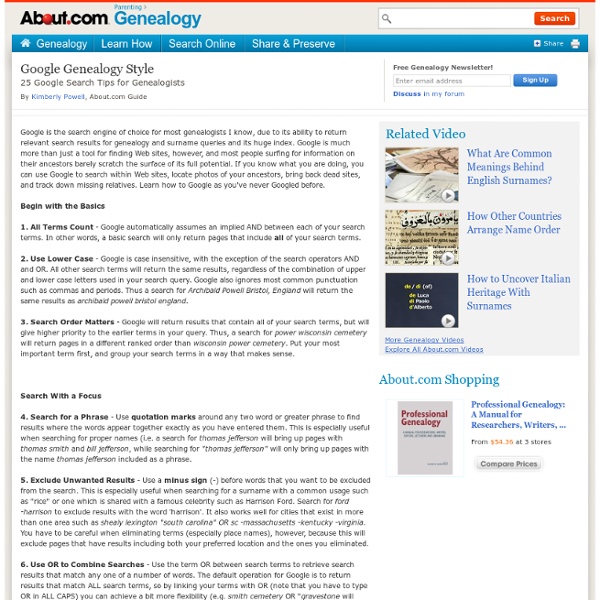Google Genealogy Style - Google Power Search Tips for Genealogists

Learn to Use Google in Genealogy Searches - Google Genealogy Tips
Since the Google search engine went live in September 1999, it has changed the way people search the web. Today, many genealogists use Google for their genealogy internet and surname queries, and for good reason. Not only does Google produce accurate and relevant search results, Google is extraordinarily fast and flexible. However, Google has evolved over the years and the tips and tricks have changed and evolved also. Word for Word Every word counts in your search query and generally all words in your query will be used for the search. Exact Search Surprisingly, sometimes the words in your search query may not appear on the websites that appear in your search results. To get an exact search, where ALL the words of your search query appear in your search results and that NO stemming and NO synonyms are used, you can do one of two methods: Use Double Quotes [“ ” ] around one keyword or multiple keywords when you want an exact match. Don't phrase your query as a question Google Math Spelling
Burial records, cremation records, grave maps, genealogy and ancestry at Deceased Online
Google Scholar / Citation Searches Made easy
Uk Genealogy-links
Free Genealogy Resources - Home
How to find family records using the best free Internet resources Bookmark This Site (Ctrl+D) There are literally millions of web pages on genealogy and it is easy to get lost so that you can't see the forest for the trees. Where do you go first? directly to these sites and find information about your ancestors and relatives. There are two main types of Internet genealogy web sites. Many web sites describe how to do research and provide details of sources of paper and microfilm records. This web site concentrates on online tools and searchable databases of genealogy records so that you can immediately take action to find information online. What are the Steps? I hope you find this useful. 20070613
Historical Directories
The version of Historical Directories launched in February 2003 can no longer be sustained due to software and hardware obsolescence. We have therefore moved the content to a new Historical Directories Collection, part of our Special Collections Online. This work is essential in order to maintain free and sustainable public access to the resource. Update, 31 March 2014: Migration of Historical Directories is now complete and the previous website has been withdrawn. We are grateful to the many users who have provided feedback on the new site, and will continue to improve it during 2014. The Historical Directories website was launched in February 2003 as part of a Lottery funded project. Historical Directories is a digital library of local and trade directories for England and Wales, from 1766 to 1919. Some original directories contain large, fragile and folded maps.
Census records | 1841 - 1911 census records | Findmypast.co.uk
As with any family history records, original census returns are not free from mistakes; you should therefore keep an open mind when using the data and not believe everything you read. Some common errors that can be found in census returns are as follows: Errors in recording census data As illiteracy was quite high in the 19th century, many people may have asked their friends, neighbours or even the enumerators to help fill out the forms. In institutions or on vessels it was the person in charge of the prison or ship who completed the details on behalf of everyone in the institution or on the ship. Typical mistakes were made when spelling peoples’ names, or noting their occupations, or even when recording their ages. Age discrepancies Whilst enumerators and the officials at institutions made mistakes when recording information, individuals who completed the forms themselves also made some errors. Name changing Occupations Nicknames If you can’t track down James, he may be a Jim.
Related:
Related:



